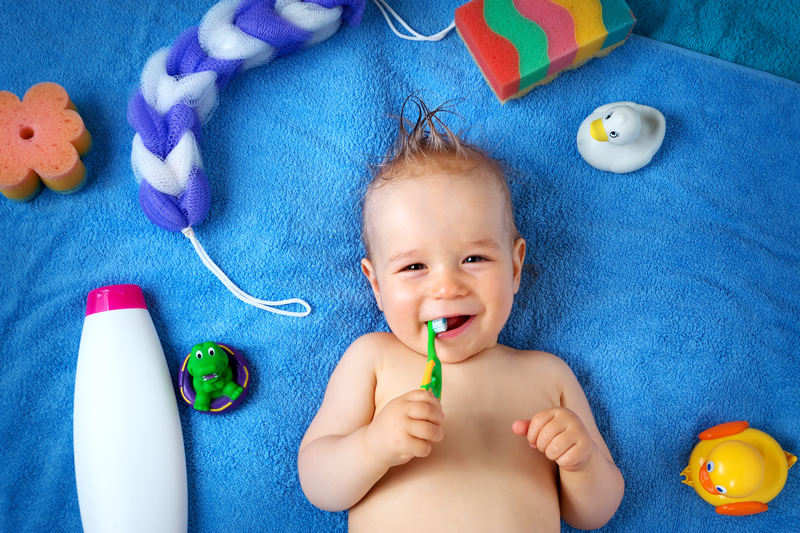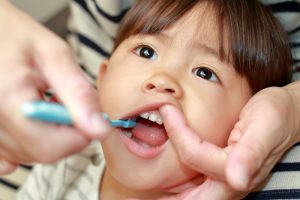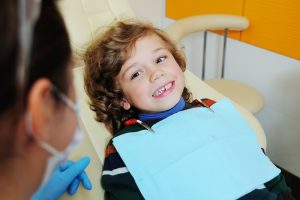What Infant Oral Care Looks Like
Receiving Dental Care During Braces
November 6, 2018Common Questions About Child Orthodontics
November 20, 2018
New parents may not know when to start taking care of baby teeth for infants. Infant oral care should start as soon as the first tooth appears. This is vital for infants if they are to make it through the childhood years without tooth loss that could affect their permanent teeth. Use these guidelines for proper oral care for infants to ensure they have the best oral health possible as they grow!
Milestones In an Infant’s Oral Health
An infant’s mouth is much smaller than an adult’s, which is why there are only 20 baby teeth in the mouth instead of the 32 an adult has (including the wisdom teeth). Those baby teeth will be more spaced out and will come in over the first 3 years of life. Most infants will start to get their first tooth sometime between 3 months and a year. However, it’s normal for infants to get a bunch of teeth very quickly or to still be over a year without the first tooth.
Most infants will have the front top two teeth come into the mouth followed by the bottom front two teeth. However, the first teeth can also be the bottom in some cases. The next 2 upper teeth will come in as well as the next 2 bottom front teeth and so on through the back of the mouth. The molars of infant’s mouth will start to come in somewhere around age 2, which is why those teeth are sometimes referred to as the “two-year molars”.
An infant will get their teeth in and will keep those teeth until anywhere between 5 and 11 years old. Children can start losing their teeth at 5 or 6, but should not lose them much sooner than that. Children should also see an orthodontist around age 7 or 8 so that bite and alignment can be examined. This is a key time when baby teeth are falling out and we can see if the adult teeth are coming in correctly. After this age, the baby teeth will start to fall out more rapidly and adult teeth will start to come in. However, there will be more adult teeth, as the mouth is larger than it was in infancy.

Infant Oral Care: Where to Start
Infant oral care is important to prevent baby teeth from decaying and falling out too soon. This can create problems with eating, chewing, speaking and with adult teeth coming into the mouth in the wrong place. With infants, use a damp cloth to clean the gums from milk sugars. Do the same when infants move on to baby food. A small rubber gum brush may be more gentle for some infants in cleaning the first few teeth than a child toothbrush would be.
Use only a rice-sized amount or smaller of toothpaste for infants and clean their teeth at least morning and night. Infants should have their oral care before bed after a bottle (if possible) to remove sugars that can decay the teeth at night. Never put a baby to bed with a bottle for night time or naps, as constant exposure to sugars can decay the teeth, leading to “baby bottle tooth decay”. Speak with your dental professional to know when flossing should start when the teeth start to come in.
Infant Oral Care to Adult Oral Care
Great oral hygiene habits can start off at a young age, even in infancy. The better an infant’s oral care is, the more likely their oral care will be as children and eventually adults. When oral hygiene habits are established early on, they start to become second nature. Brushing and flossing won’t be a chore, because children understand and can feel the difference between clean teeth and dirty teeth that lead to infections and disease.
When your little one is tiny, you will have to provide them all of their infant oral care needs. As they start to be in the 1-2 year range, they may want to start practicing with a toothbrush. You can brush their teeth with them, have them practice with you, or they can hold a second toothbrush while you brush their teeth. Flossing won’t need to happen until an infant grows into a young child and the teeth come together more. Throughout those first years, you will have to make sure you are brushing an infant’s teeth several times a day.
Children should start oral hygiene practices as soon as they are able. Around age 3 is when they will have the dexterity to start doing it themselves with supervision. Brush your own teeth with them and monitor children as they grow into teens. The American Dental Association recommends brushing the teeth for at least 2 minutes at a time, twice a day. Brush all tooth surfaces with fluoride toothpaste and follow up with flossing. Floss 1-2 times a day, getting up into the gum line, scraping the teeth as you go. These basic oral care guidelines should happen all throughout life no matter the age of the person.

Better Health with Dental Services
Did you know that we offer free infant dental exams? Instead of trying to figure out when your child needs to first see a dentist, start with the recommendation of around 1 year of age. The American Academy of Pediatric Dentistry recommends infants visit a dentist as early as 1 year of age or within 6 months of the first tooth erupting. Toddlers should also see a dentist if they reach age 3 and still don’t have their baby teeth.
After that first visit, children will start their biannual exams and gentle dental cleanings every 6 months to make sure the delicate baby teeth don’t decay. These oral care checkups are vital for preventing early tooth decay and oral health problems in infants and children that could lead to oral problems in the teenage and adult years. To schedule your infant or child’s comprehensive dental exam, call Hardy Pediatric Dentistry & Orthodontics today at (720) 887-6003!